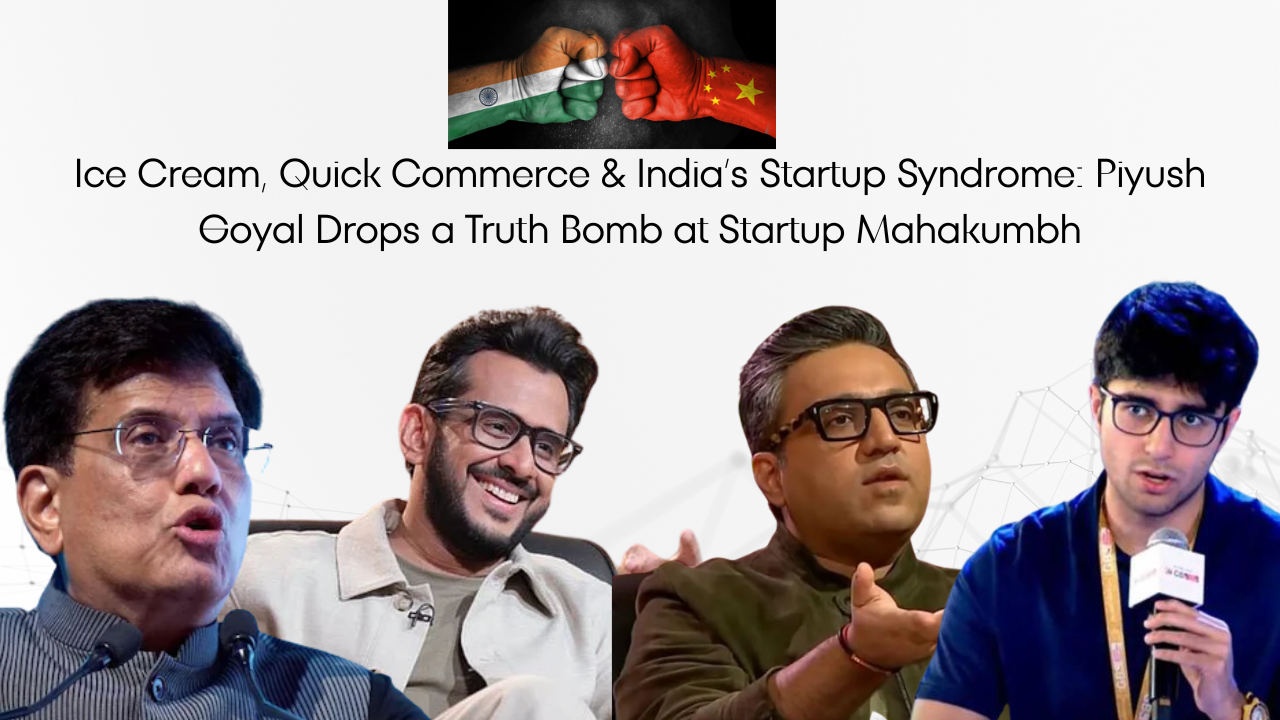New Delhi — At the grand Startup Mahakumbh 2025, where India’s brightest entrepreneurs gathered to celebrate innovation, Commerce and Industry Minister Piyush Goyal took the stage — not with a congratulatory speech, but with a cold, hard “reality check.”
“I have a lot of nice things I could talk about,” he began, “but I have a slide I want to show you that disturbed me.”
The slide, titled “India Vs China: The Startup Reality Check”, sparked the kind of silence only hard truths can create. It boldly compared India’s dominant startup verticals — foodtech, D2C brands, and 10-minute grocery apps — with China’s deeptech advances in EVs, semiconductors, AI, and robotics.
While China is busy building the future, India, Goyal suggested, seems content repackaging chips, selling ice creams as “healthy,” and riding the food delivery boom.
“Are We Making Ice Cream or Innovation?”
Goyal didn’t hold back as he took aim at the country’s growing obsession with convenience startups.
“Are we going to make ice cream or chips?” he quipped. “Aman Gupta, change your investment perspective on Shark Tank!”
Even audience members like boAt co-founder and Shark Tank judge Aman Gupta weren’t spared as the Minister sarcastically nudged investors toward more ambitious bets in deeptech.
Goyal’s central concern was clear: while India boasts the third-largest startup ecosystem, it lacks a presence in cutting-edge tech, relying instead on flashy packaging, quick fixes, and low-barrier consumer models.
Zepto’s Zing: We Deliver Jobs, Not Just Groceries
Though Goyal didn’t name names, his criticism landed squarely on the likes of Zepto, India’s poster child for quick commerce.
Aadit Palicha, Zepto’s co-founder, swiftly responded, pointing out that the startup had created 1.5 lakh jobs and contributed over ₹1,000 crore in taxes.
“There are very few Indian startups that can say they pay over ₹1,000 crore in taxes or employ over 1.5 lakh people. We’re proud to be one of them,” Palicha stated.
Zepto, which recently filed for IPO and is backed by General Catalyst, Lightspeed, and Y Combinator, exemplifies the tension between economic impact and perceived innovation.
Enter Ashneer Grover: “Try a Mirror Instead”
Never one to stay silent during a controversy, BharatPe cofounder Ashneer Grover entered the chat with his trademark wit:
“The only people who need a reality check are politicians.”
He didn’t stop there.
“Let the government deliver 10% GDP growth, and we’ll deliver the EVs and semiconductors.”
Grover’s remarks struck a chord across social media — pointing to the broader frustration among founders over lack of government support, funding bottlenecks, and bureaucratic red tape.
The Deeptech Dream: Big Talk, Tiny Cheques
While Goyal painted a future where India leads in AI, robotics, and semiconductors, founders and investors were quick to point out the lack of early-stage domestic capital — a problem that continues to plague deeptech startups.
Padmaja Ruparel, cofounder of Indian Angel Network, echoed similar concerns, noting how India is steadily losing out on healthtech and deeptech innovators to foreign markets due to lack of Indian funding.
Even Anupam Mittal chimed in, tweeting:
“It’s easier to get married than to raise for deeptech in India.”
Cash Prize or Quick Fix?
To remedy the situation, the Startup Mahakumbh featured competitions with prize pools worth ₹70 Cr for innovations in cybersecurity, biotech, AI, and robotics. Goyal even pitched for a ₹500 Cr pool in the next edition, calling on ministries, unicorns, and industry leaders to pitch in.
But founders are skeptical.
“Contests and cheques are nice,” said one founder anonymously, “but deep innovation needs ecosystems, not just applause and prize money.”
Dukaandari vs Disruption: Can’t We Do Both?
Goyal’s message was clear — India must graduate from “dukaandari” (retail businesses) to global innovation leadership. But many in the startup ecosystem argue it’s not an either-or situation.
Yes, we need deeptech.
But it’s also India’s so-called “ice cream” startups that:
-
Employ lakhs of people
-
Digitize kirana stores
-
Serve last-mile customers
-
And power a massive consumer economy
To many, disparaging these businesses feels less like motivation and more like a disconnect from the ground reality.
Final Thought: From Pitch Decks to Policy Push
India doesn’t lack talent or ambition. What it needs is domestic capital, policy clarity, and genuine support — not selective sermons.
Because right now, it’s easier to get a samosa at midnight than it is to get a government grant for a robotics startup.
Until that changes, perhaps it’s time we stop judging startups by what they deliver — and start supporting how far they can go.
Parivesh Singh Gupta is the founder of TweeLabs, with over 12+ years of experience in digital marketing, SEO content writing, web development, and eCommerce solutions. He specializes in WordPress development, Meta & Google Ads, Shopify & WooCommerce, Canva-based design, and AI automation.
Parivesh helps startups and growing businesses achieve online success through high-converting strategies, powerful ad campaigns, and SEO-rich content that ranks.
For collaborations or consulting:
Email: parivesh@tweelabs.com
Website: www.tweelabs.com
Follow on LinkedIn: Parivesh Singh Gupta

